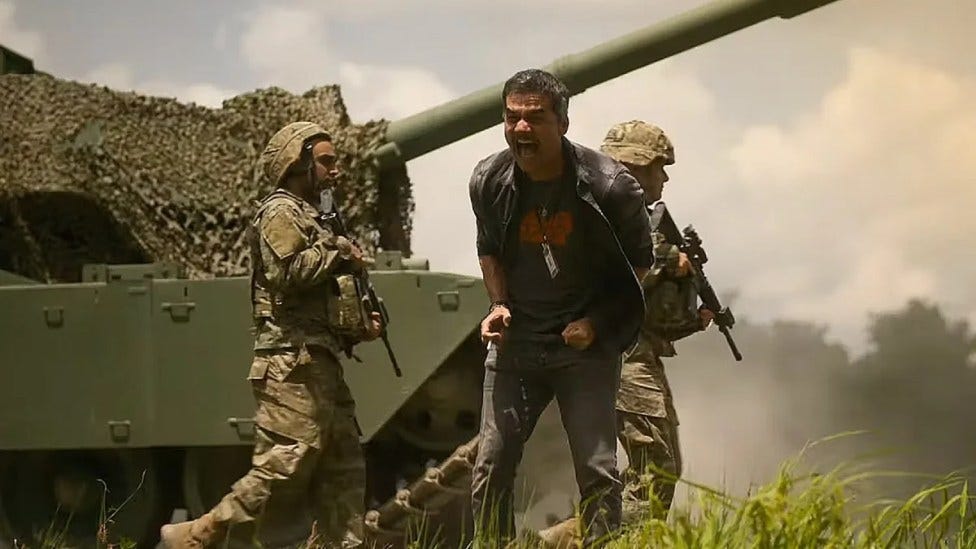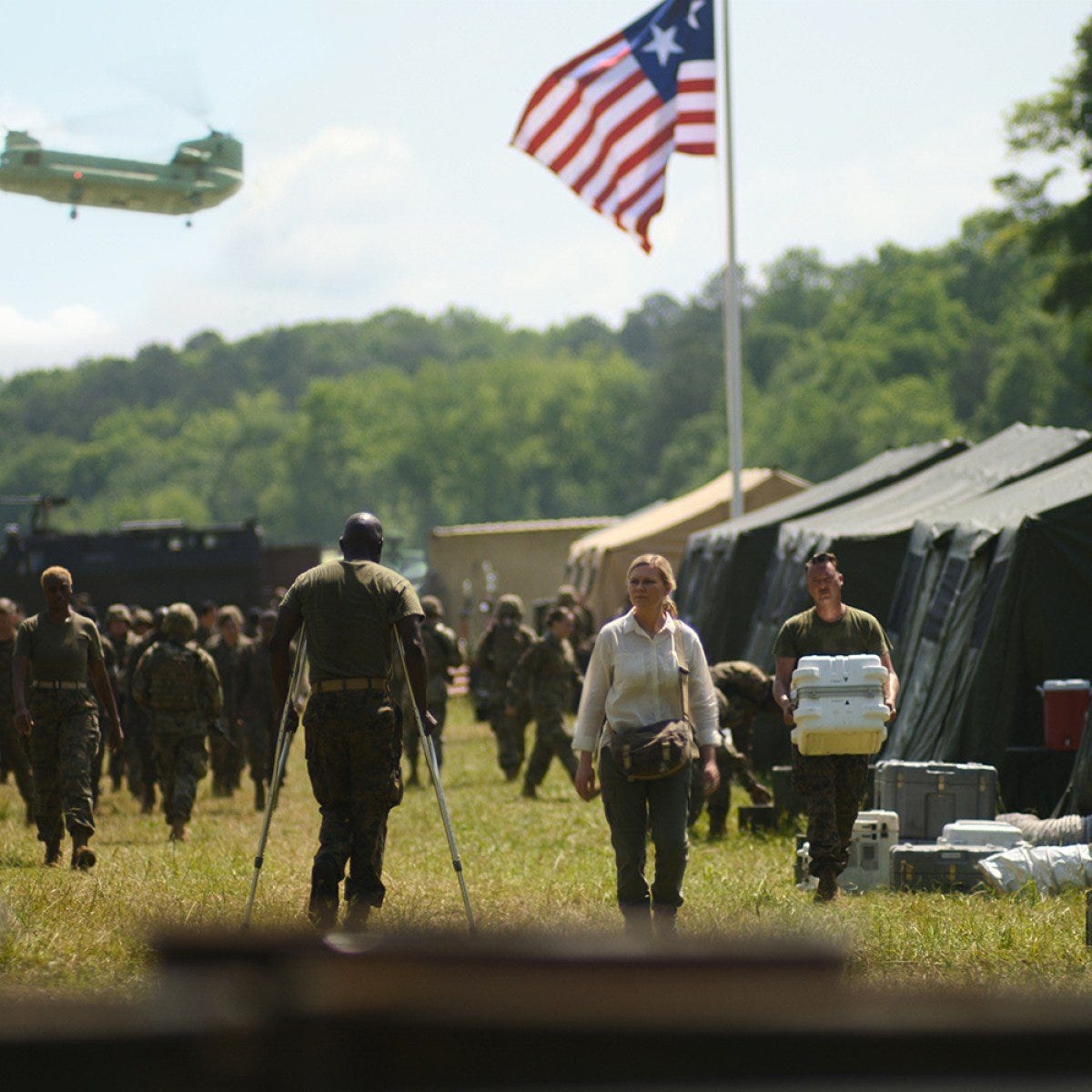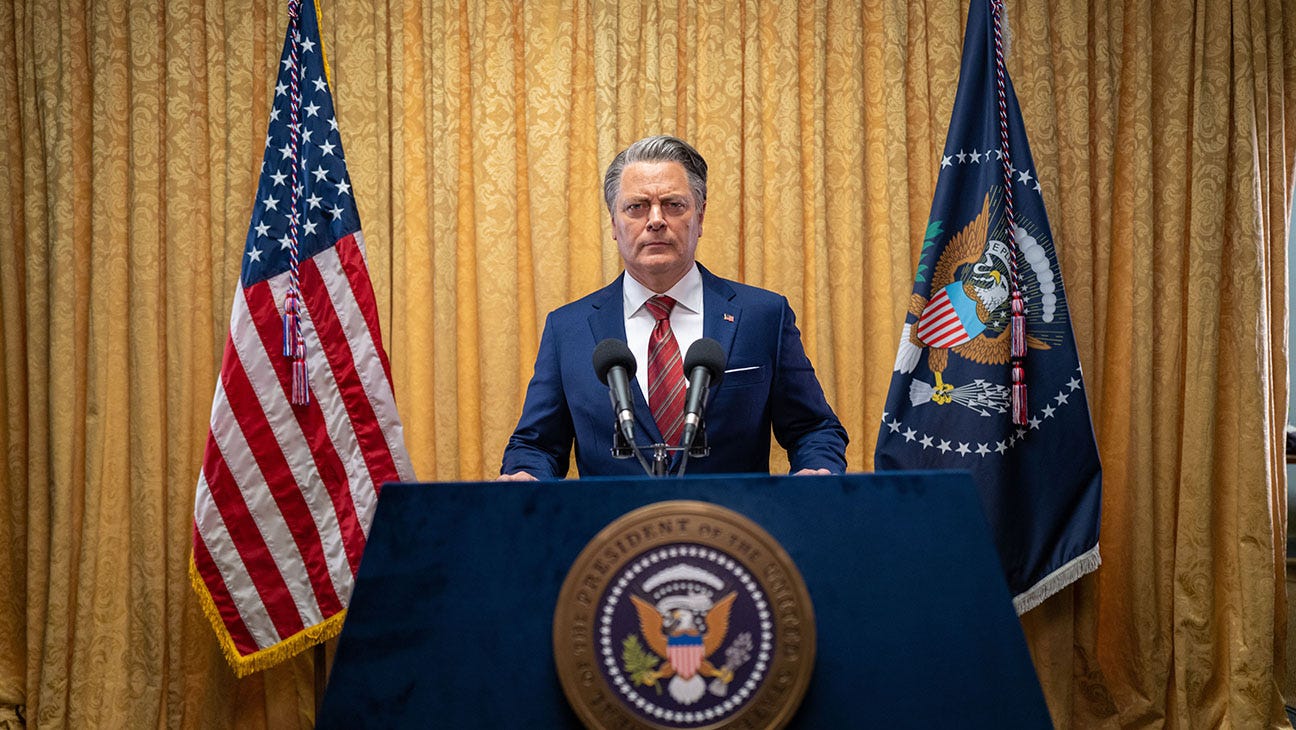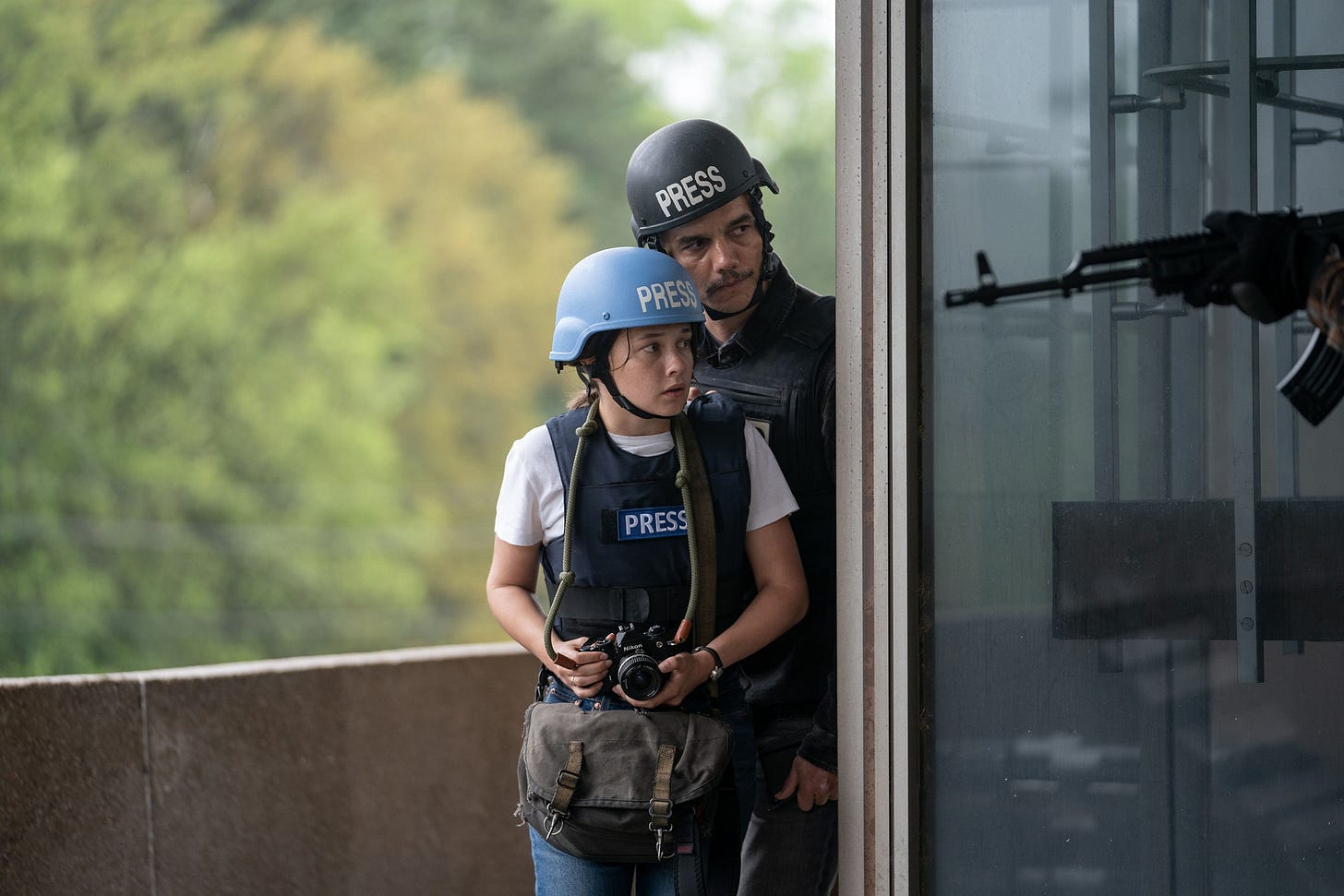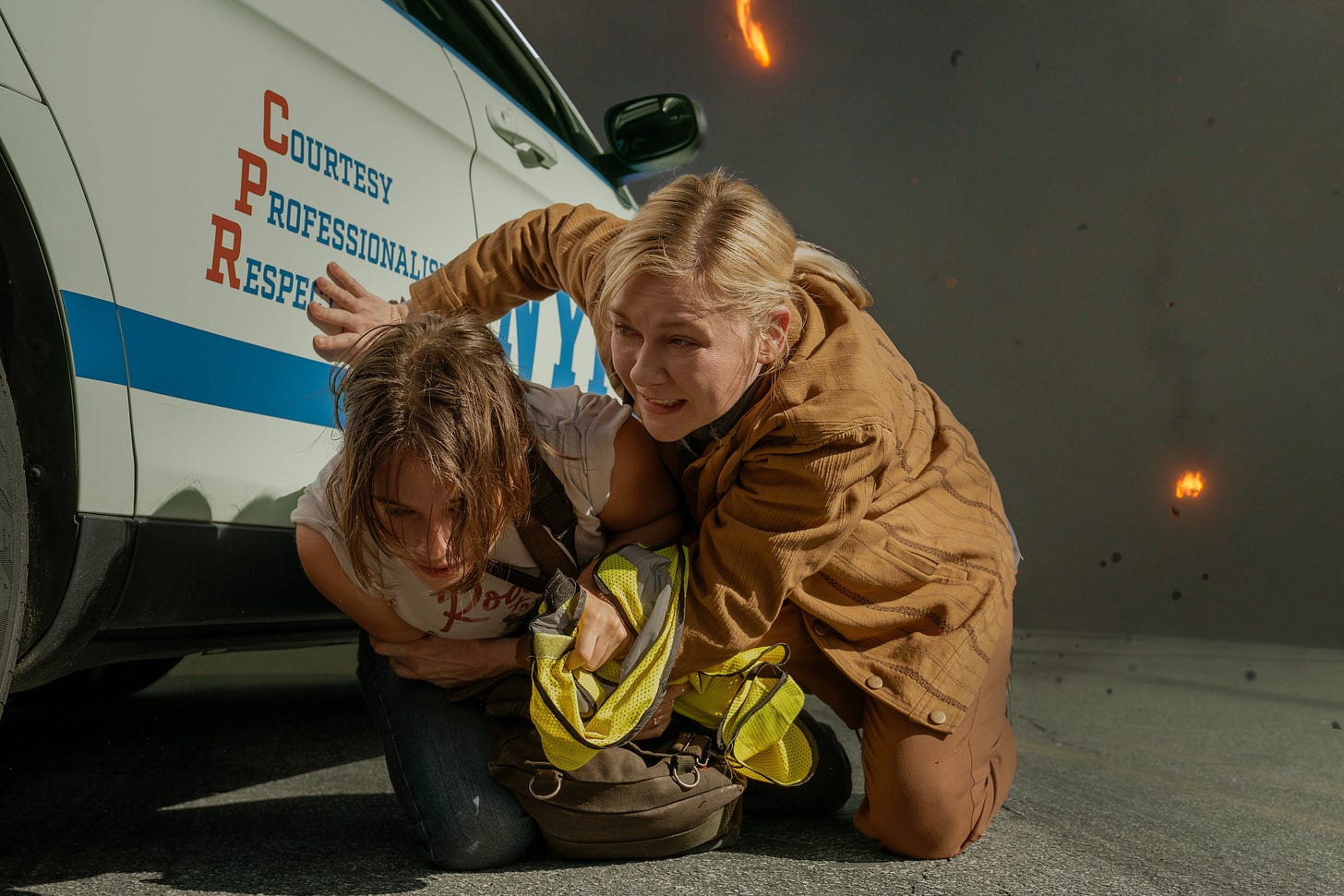Civil War: Review
Maybe there wouldn't be heroes in a second civil war but there's definitely none in this film
*checks to see if anyone’s still here…*
Well if you are I appreciate the support and patience. 2024 has been off to a pretty slow start and no films have motivated me much to finally end this extended hiatus. Dune 2 was a visual and world-building spectacle and 2024’s only great film so far (I’m posting this later than I wrote that statement, there’s a few other great films I’ve seen since, more to come on those…), but it also depends a lot on its predecessor’s setup. Most everything else this year has raised little interest.
However, Alex Garland’s most recent film Civil War is interesting for a number of reasons. For one, it directly confronts a lingering fear I think most Americans have felt building over a long time, but compounded in the last four years. The fear our politics has reached an unresolvable point of division and that we’re nose-diving into an actual civil war.
I was extremely skeptical about this film mostly because it’s easy to exploit popular fear without demonstrating a meaningful reason to do so in the first place. There’s a lot of money in alarmism. Its contagion is dangerous as well. And with production studios’ obvious difficulties to fill theaters in a post-Covid world of streaming (whether that’s movies or Fortnite), a film about a modern civil war is almost a little too poignant.
But Garland is no random schmuck to be given the reigns. The writer/director has a lot of talent, creating one of the best modern science fiction movies in Ex Machina (2014) and a solid follow-up with Annihilation (2017). Garland’s films also don’t just have a stylistic voice, he dives deep with his writing and concepts to the seabed of the human condition scooping up whatever he can find.
What Garland brings up to the surface in Civil War is a strange mix of a lot of something and a lot of nothing. His presence is noticeable as he creates quiet horrors of a nation turning on itself. There are moments when Garland cuts the sound or pauses the action to view a newly taken picture by a photographer. Our lead characters are these photographers seeking the Holy Grail of this civil war: a photo of the recluse president (Nick Offerman). Not because he is the next Lincoln ready to inspire hope in a broken nation, but because seemingly every other thing has already been photographed. Our lead journalist Lee (Kristen Dunst) has seen every facet of war and photographed any type of historical atrocity, but a picture of the president during a civil war could be the ultimate moment in history.
The president is one of the few interesting characters in Civil War. The film begins with one of his speeches declaring that the “Western Forces” have just incurred a devastating blow, perhaps indicating that we’re tuning in for the final push to save the Union. Yet we never see Offerman again until one final scene. And as the story pushes on we start to wonder how in touch POTUS is with the reality of his administration’s situation. The Western Forces are on the front door of Washington DC and journalists like our lead characters are viewed as enemies of the state.
Yet who are the Western Forces and what exactly did the president screw up so badly to get California and Texas to join the same team? How long has the war lasted? We know the president is on his third term, but did that trigger the war or was it a necessary amendment to keep leadership consistent like FDR? And what were the mechanisms to trigger secession? Is there a Napoleonic general in the Western Forces drunk on ambition, or a 1776-like revolutionary group looking to restore the American spirit from the hands of a fascist government?
Garland neither confirms nor denies anything indicating that it all doesn't matter. And in a way, it’s a bit refreshing. Cinematic universe after cinematic universe makes you rethink how valuable a film’s story really is when it depends on original and well-established lore (aka exposition). Historically, the less the better with most films, but the MCU has flipped that formula on its head.
The unclear nature of the whole war is an intentional narrative choice by Garland, which mostly works to the film’s advantage from a conceptual level. However, without messianic figures or epic recounts of alternate history to care about there must be some other narrative force we can stake our emotions in. Something human that grounds the film and tethers us to its characters. What drives Civil War’s journalists to embark on this photography campaign?
Ultimately, not much, which tragically causes our characters to be so boring.
This isn’t due solely to the acting. Dunst provides a semi-decent performance as a veteran war photographer who eats PTSD-inducing events for breakfast. Stephen Mickinley Harrison stands out the most as he’s the only one who acts not just awake, but actually alive. I’m glad we’re not bogged down and wasting time with some alternative history lore, but this ultimately bleeds into our characters and their motives to the point where they look similar to The Walking Dead’s walking dead.
There’s never much of a sense that our characters actually want to be on this mission to photograph the president. Obviously, the outward motivation is the obsession with the next Raising the Flag at Iwo Jima or Bush being briefed on 9/11, but unlike the real human emotions those photos illicit, no one in Civil War exhibits any of those same emotions or tries to capture anything but an adrenaline rush.
It’s a real shame because there is an earnest attempt by Garland to capture something human about photographers’ subjects in historical struggles. It’s easy to fantasize about history’s most impactful struggles and daydream a new revolution. But do these fantasies include hanging desperate looters from a gas station or trapping your neighbor in a tire and burning them to death? These images are haunting and a sober awakening from such fantasy. Garland treats them appropriately without trying to make some personal statement, and instead simply asking us, is this left out of your imagination of history?
Yet in Garland’s narrative search to find humanity in a war-torn country, his characters display little of said humanity. It’s difficult to see the world through their eyes especially when they’re such dull anti-heroes. Civil War is a bit too on the nose that struggle isn’t always good versus evil and that heroes and villains aren’t common in history. But it forgets that in stories and movies, they’re necessary.
Final Thought:
2.5/5
(oh yea and I’m changing my rating scale - 100 different point options was crazy!)





